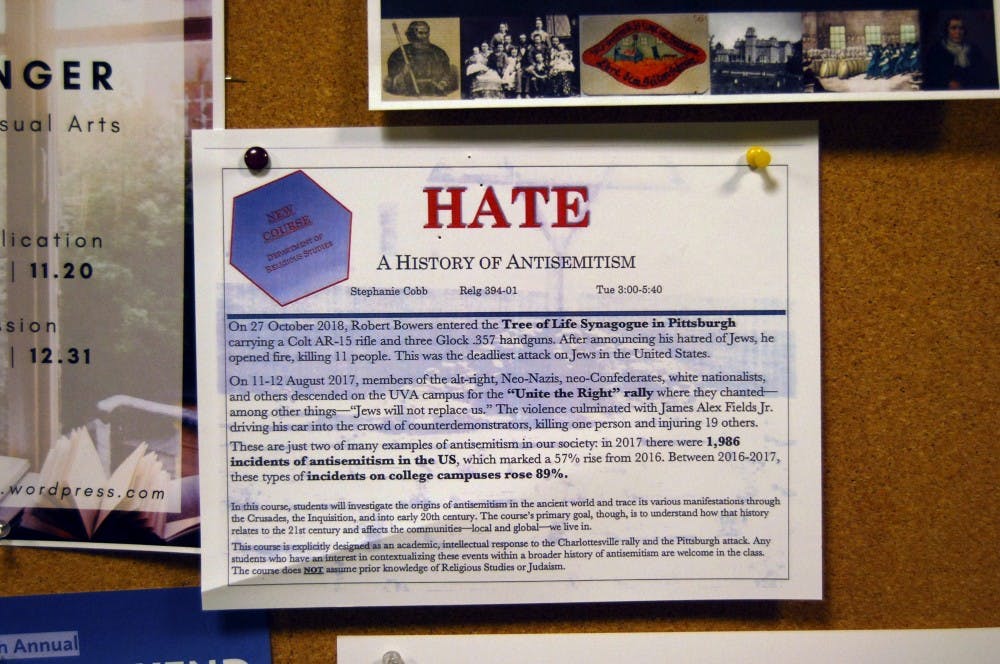In response to the recent shooting at a Pittsburgh synagogue and Charlottesville Rally, the religious studies department will offer a new class next semester titled “Hate: A History of Antisemitism," in the hope of unearthing the antisemitism affecting local and global communities.
The class, a 300-level elective in the religious studies program, was crafted by the chair of the department, Stephanie Cobb, in a moment of urgency when she heard about the Oct. 27 shooting at the Tree of Life synagogue in Pittsburgh, which was the deadliest assault on Jews in the U.S., she said.
According to the Anti-Defamation League, acts of antisemitism have increased nearly 60 percent since 2016.
"It just seems like our responsibility as educators to speak to the moment when we can," Cobb said.
Cobb's class will unearth the meaning of and implications behind these spikes in antisemitism.
"The rise in antisemitism is something we ought to struggle together with," Cobb said. "And I don't think we can do anything about it until we can understand the roots of it."
The class is designed to begin with a history of Judaism and antisemitism, then quickly move into antisemitism in the last couple of years, Cobb said.
Cobb is not the only person on campus worried about the rises in antisemitism. Jewish chaplain and director of religious life Josh Jeffreys expressed similar concerns.
"I believe that Jews have enjoyed relative privilege in America, which has made it easier for Jews and non-Jews alike to overlook antisemitism and focus on other forms of hate and bigotry," Jeffreys said. "The Tree of Life shooting was a deadly reminder that antisemitic rhetoric has violent consequences if left unchecked, and I believe we as a society need to recognize the importance of addressing antisemitism today."
Addressing that issue will be at the center of Cobb's class. The class will delve into specific incidents of antisemitism, large and small, in order to understand why it is going on, Cobb said. Cobb emphasized her attention toward UR and learning more about any antisemitism in our own community.
It is estimated that about six-to-seven percent of the undergraduate student body identifies as Jewish, Jeffreys said. Although the numbers are small, UR has been able to foster a robust Jewish community.
"I think that while the Jewish community here at UR is small, it is strong," said senior Anna Lowenthal, who has been a part of Hillel, the Jewish campus life organization, since her first year. "I have been told by people that I am the first Jewish person they have met, which is a little jarring.
Enjoy what you're reading?
Signup for our newsletter
"Being Jewish on the campus can be a little strange. However, I don't often feel reminded I'm not in the norm."
Cobb's class, with 12 seats, quickly filled up and already has a wait list. Cobb said that the student interest in this issue gave her hope, because many people seemed to think antisemitism had been resolved and was not a modern issue.
The course is not cross-listed, but Cobb thinks that could be possible in the future, she said.
Cobb said she hoped the class would create a new dialogue about antisemitism and biases on campus and help to further foster our diversity, inclusivity and ability for everyone to thrive.
Contact news writer Heather Neiman at heather.neiman@richmond.edu.
Support independent student media
You can make a tax-deductible donation by clicking the button below, which takes you to our secure PayPal account. The page is set up to receive contributions in whatever amount you designate. We look forward to using the money we raise to further our mission of providing honest and accurate information to students, faculty, staff, alumni and others in the general public.
Donate Now



